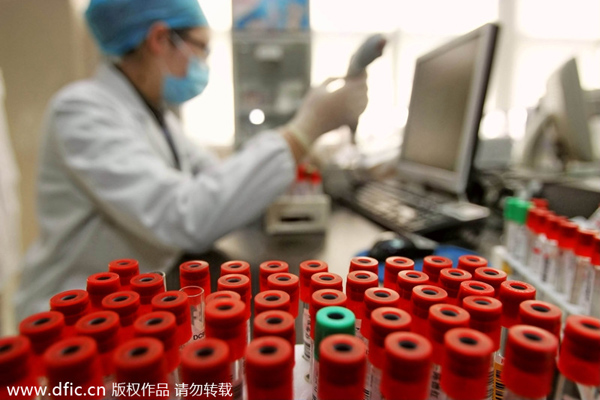|
 |
| A health worker puts HIV test information to a computer at a hospital in Nantong, East China's Jiangsu province on Nov 29, 2012. [Photo/IC] |
A Henan province regulation requiring new college students to be tested, on a voluntary basis, for HIV is raising concerns over discrimination and privacy.
The regulation on HIV prevention on campus, issued on Thursday by Henan's education and health departments, requires that testing be included in the health checks for students of junior colleges and polytechnic schools before their freshman year.
Wang Zhe, deputy director at the Henan Center for Disease Control and Prevention, said on Tuesday that the tests are voluntary and meant to promote awareness of HIV and AIDS prevention among college students.
"If students are willing to be tested, we will provide it to them for free," he told Xinhua News Agency.
 |
One of the most populous provinces, Henan has 40,000 HIV/AIDS patients and more than 4,000 new patients each year, according to the provincial health department.
Sexual transmission has replaced blood transmission as the top means by which HIV is spread, accounting for more than 90 percent of new cases.
Xu Hui, a publicity official at the Henan Health and Family Planning Commission, said the authority will issue more notices giving guidance to the HIV test for the new college graduates. She declined to provide more information.
Some patients and patient's rights groups have concerns.
"I don't accept the new requirements, and I hope my daughter will not be forced to receive such testing," said a 42-year-old HIV-positive patient in the Huangfanqu Farm in the province who requested anonymity. She has a daughter who is a freshman in college.
"People with such diseases are under immense mental pressure. Such a regulation would only increase the pressure on them," she said.
The new policy also caused an outcry among some netizens and stirred heated discussions online.
"Health authorities should put their priorities on education and publicity of HIV/AIDS prevention. I highly doubt whether universities could protect the privacy of the students," said Sina Weibo user Heyuanjushi.
Wu Zunyou, director of the National Center for AIDS and Sexually Transmitted Diseases Control and Prevention, has voiced his support for the new policy in Henan.
"The increase of routine tests could only reduce the discrimination to HIV/AIDS patients," he said.
Wu said close to 50 percent of HIV/AIDS patients in China are unaware of their disease, and more than half of the people who died of AIDS last year learned of their disease during their first testing in the same year.
"Earlier testing, diagnosis and treatment could prolong the life of patients," he said.
Wu also dismissed the fear that the tests could deprive the patients of opportunities to receive a college education, adding that the province now has hundreds of HIV and AIDS patients on college campuses.
Some parents voiced their support for the policy.
"It is a measure responsible for the student's health. The question is, if students' privacy is disclosed by the students, will there also be measures of punishment?" said Pan Yongsheng, the father of a high school student in Pingdingshan.
Contact the writers at [email protected] and [email protected]
